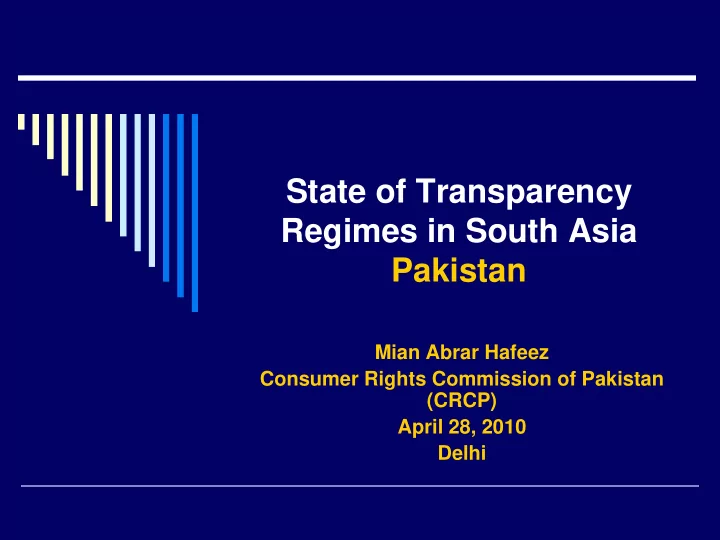

State of Transparency Regimes in South Asia Pakistan Mian Abrar Hafeez Consumer Rights Commission of Pakistan (CRCP) April 28, 2010 Delhi
“Where secrecy and mystery begins, vice or roguery is not far off.” Dr. Samuel Johnson
Schem e of Presentation Legal and Policy Debate on RTI in Pakistan Issues and Challenges in Practicing RTI Way forward
Constitution of Pakistan Article 19 freedom of information as a part of “right to expression” Article 19 A (part of 18 th Amendment) Every citizen shall have the right to have access to information in all matters of public importance subject to regulation and reasonable restrictions imposed by law.
FOI Legislation in Pakistan 1990 Professor Khurshid Ahmad Khan presented the first ever bill on FOI. The bill was opposed and failed to become a law. 1994 Public Accounts Committee, headed by Senator Malik Qasim presented second FOI bill, but could not be enacted. 1997 FOI Ordinance was promulgated, but lapsed after six month and could not become a law.
FOI Legislation in Pakistan 2001 Local Government Ordinance 2001 provides for openness, transparency and access to information from local government bodies In 2002 CRCP proposed Model Freedom of Information 2002 Freedom of Information Ordinance was promulgated by the President of Pakistan 2004 Rules for Freedom of Information Ordinance, 2002 notified 2005 Balochistan Freedom of Information Act 2005 enacted
FOI Legislation in Pakistan 2006 Sindh Freedom of Information Act 2006 enacted 2007 Freedom of Information Rules for Balochistan Freedom of Information Act 2005 notified
FOI Policies 2005 Punjab Police becomes the first government department in Pakistan to develop its Freedom of Information Policy 2007-date Draft FOI policies developed for 3 government departments under AJP with technical support of CRCP Establishment Division and its attached departments Provincial Services and General Administration Departments (S&GADs) Provincial Police Departments
Reflections FOI Ordinance, 2002 A Partial Success but a Step in Right Direction Restrictive Scope Basic presumption Access to Records about Policies, Guidelines, Licenses or Final Orders Broadly Defined Exemptions Notes on Files Minutes of the Meetings Records Relating to Defense Forces or National Security Records declared officially Classified Private / personal Information (AIDS) Record excluded from the Purview in Public Interest No Over-riding Effect Inadequate Review Processes Designated Officer Head of the Public Body Ombudsman
Flow of Request/ Com plaints under FOI 2 0 0 2 FOI Ordinance 2002: Various Provisions Clause 4-Maintenance Application Accepted and indexing of records; I nform ation would Clause 5-Publication be provided and availability of Application Duty to records; Designation for Assist of Official Obtaining Application Rejected Clause 6- Requestor I nform ation in writing alongwith Com puterization of reasons records; Clause 7- Declaration Valid I nvalid of public records. Reason Reason Procedure for Disposal of Head of the Application Departm ent 1. Determine Recourse to the Response of Get the Deposit an Submit Om budsm an required designated prescribed initial fee application and Federal inform ation official application of Rs.50 form Tax within 21 2. I dentify the form Om budsm an days relevant departm ent CRCP 5 / ministry
Adversarial Legislation Official Secrets Act, 1923 Article 6 of ‘The Evidence Act, 1984’ Maintenance of Public Order Ordinance, 1964
Local Government Ordinance, 2001 Section 137……….. Every citizen shall have the right to information about any office of the District Government, Tehsil Muncipal Administration and Union Administration
FOI Bill 2 0 0 8
Background to the FOI Bill 2 0 0 8 Debate on deficiencies in existing Federal and provincial FOI laws Sherry Rehman, while in the opposition, proposed FOI Bill 2004 with substantive improvements; Bill introduced as private member bill but could not be debated in the National Assembly FOI Bill 2008 is a modified version of the 2004 FOI Bill being pushed by Sherry Rehman
Strengths of FOI Bill 2 0 0 8 vis-à-vis Existing FOI Law s A national law – will apply to federal, provincial as well as local bodies List of records to be published and made available for public access broadened Includes correspondence, summaries and notes in public records De-classification of records after 20 years of initiation Provides for recording reasons of classification Reduces time of application process from 21 to 14 days Over-rides other laws in force
W eaknesses of FOI Bill 2 0 0 8 vis-à-vis Existing FOI Law s Does not improve the definitions of vague concepts Definition of public records appears to be more restrictive than existing FOI laws; Final decisions on certain matters excluded unless implemented No substantive improvement in institutional mechanism for filing and processing of information requests and complaint redress Does not provide for whistleblower protection
I ssues and Challenges in Practicing RTI / FOI Law s FOI Legislation is Not available in all the provinces Lengthy procedures: disposal takes 4 to 15 months limited CSOs base and weak capacity Weak Demand Side : interface between political parties, media and CSOs is largely missing Preparedness of public sector is not there
W ay Forw ard FOI law need to be brought in line with International best practices Demand side of FOI reforms need to be cultivated Vibrant interface between CSOs, media and political parties required. Capacity building of CSOs to effectively use FOI Laws Public sector: Training of officials for implementation and compliance with FOI Laws Using new technology for the promotion of FOI
Thank You For Contact CRCP: main@crcp.org.pk, UAN 9251 111 739 739 “A popular government without popular information or the means of acquiring it, is but a prologue to a farce or a tragedy or perhaps both” James Madison
Recommend
More recommend